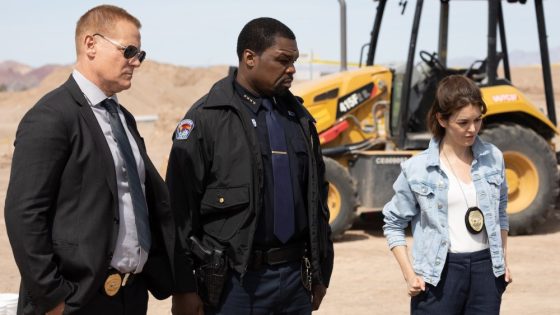You might expect a film that begins with Mel Gibson announcing, “The Bible says we should rejoice in our suffering,” to be a little more high-minded than “Boneyard.” But this trashy trawl through a fictionalized version of the “West Mesa Murders” — a still-unsolved southwestern crime spree in our century’s early years — is the kind of dubiously moralizing exploitation exercise that makes “Sound of Freedom” look like a noble class act by comparison.
Likewise “inspired by true events,” Asif Akbar’s movie alternates between lurid serial-killer suspense not far removed from the retro grindhouse ogling of concurrent “MaXXXine” and a convoluted procedural involving variably corrupt, conflicting investigators. Four screenwriters are credited, to results that feel very much like four screenplays shuffled to comprise one awkward narrative deck of cards — from which marquee name Gibson has been largely dealt out. Too cluttered to be dull, but frequently clunky and inept, this weak would-be thriller will not be making anywhere near the noise “Sound of Freedom” managed. Lionsgate is releasing it on demand July 2 and to limited theaters on July 5.
The bodies of 11 women aged between 15 and 32 were found in an arroyo outside Albuquerque in 2009, after a local walking her dog found a human bone and alerted authorities. Once remains were identified, the victims turned out to be mostly Hispanic sex workers buried four to eight years earlier. While police did interview several suspects, none were ever charged or definitively connected to the case — though notably the killings did appear to halt after one of those men was shot to death in 2006.
Here, a similar discovery prompts police chief Carter (Curtis “50 Cent” Jackson) to assign partnered homicide detectives Young (Nora Zehetner) and Ortega (Brian Van Holt) as principal investigators. But they’re also joined by outside help in the form of Agent Petrovick, another in Gibson’s long character line of boozy trainwrecks who nonetheless have more bloodhound instinct on the job than everyone else combined. He announces the elusive perp is most likely a 30-something male Latino “mission-oriented killer,” explaining, “He thinks he’s making the world a better place, getting rid of all the people who make him sin.”
Fitting that profile precisely is heavyset, bespectacled loner Caesar (Weston Cage Coppola), whom we see lurking ominously in the vicinity of various young women, “pros” and otherwise. But then suspicion also falls on Officer Tate (Michael Sirow), known as “the sleaziest cop on the beat,” who’s known to have had questionable exchanges with nearly all the late victims — as well as possibly drug cartels, human traffickers, etc.
Mostly kept on the narrative margins — though he frequently windbags hard-boiled philosophical nuggets in voiceover narration — Petrovick tries to center himself by telling us, “This case was … personal.” He’d lost a daughter to a drive-by shooting some years earlier. But then this is the kind of cliché-riddled enterprise in which it’s “personal” for everybody, as nearly all the principal figures have some contrived backstory of similar tragic loss. The script’s jumble of subplots, flashbacks and digressions has scant binding structural integrity. It seems more focused on giving each featured player a Big Scene of crying or violent hysteria — even if their part is so brief, it gets practically nothing else.
Prolific writer-director-producer Akbar, who’s had his name on a couple dozen under-the-radar films in the last few years, does not demonstrate much aptitude for handling actors. So the cast is pretty much left to its own devices, to wildly uneven effect. Gibson, co-writer-producer Vincent E. McDaniel (as Tate’s narcotics department superior) and several others maintain some degree of dignity and credibility. Zehetner and Van Holt’s teaming is defeated by poor writing, while those playing villainous roles are given way too much leeway to ham it up. A few participants seem completely hapless — perhaps the most conspicuous and bewildering among them being Jackson, who’s done way too much screen work in the 20 years since “Get Rich or Die Tryin’” to excuse a turn this stilted.
Though kept watchable by Joshua Reis’ cinematography and R.J. Cooper’s editorial pace, “Boneyard” lacks momentum, tension and atmosphere — it has the approximate texture of a TV procedural episode, complete with faux-urgent shaky cam. Portentous percussive thumps from Andrew Morgan Smith’s original score only underline those lacks.
It’s perhaps a blessing that there are relatively few actual murder scenes, as Akbar mostly cuts from women getting into strangers’ cars to the assassin’s shovel digging graves. But while the actresses playing prostitutes or other prey here generally succeed in lending their roles some sympathy, the film lacks the expertise to actually generate a sense of mortal peril. It ends with a dedication “to victims of the West Mesa Murders,” yet leaves you with the tainted feeling that those unfortunate young women have simply been ill-used once again, by a B-movie that doesn’t even do them the favor of being good.
Source Agencies

